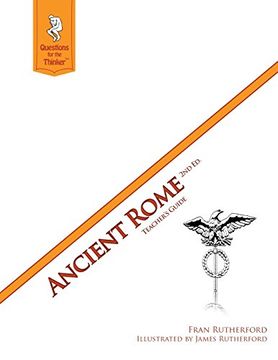Ancient Rome 2nd Edition Teacher's Guide: Questions for the Thinker Study Guide Series (en Inglés)
Reseña del libro "Ancient Rome 2nd Edition Teacher's Guide: Questions for the Thinker Study Guide Series (en Inglés)"
Fran Rutherford's two-volume Ancient Rome (Student Book and Teacher's Guide) provides an ideal course for parents who homeschool high school students and for teachers of secondary education who wish to introduce their students to the great books of Western civilization, "the best that has been thought and said," in Matthew Arnold's famous phrase. The choice of great books is appropriate, balanced, and coherent-each book illuminating an important facet of Roman thought and culture and embodying the moral wisdom of the Greek mind. The course covers Livy's Early History of Rome and War with Hannibal, Sallust's Conspiracy of Catiline, Cicero's Attack on an Enemy of Freedom and Attack on Misgovernment, Tacitus' The Annals of Imperial Rome, Virgil's The Aeneid, Ovid's Metamorphoses, Marcus Aurelius' Meditations, Early Christian Writings, St. Augustine's Confessions and City of God, Plautus' The Brothers Menaechmi, Terence's The Brothers-a rich banquet for the mind that integrates history, literature, and philosophy for a beginning humanities student. Comprised of brief but substantive introductions to the authors and to the works, the book then poses simple but penetrating questions about each chapter or major part of the book It also presents probing questions for further reflection and discussion. For example, the questions at the end of a chapter test simple reading comprehension: "What virtue did Scipio pride himself in?" "What did Scipio do the day after taking New Carthage?" The Questions for Further Thought are contemplative and thought-provoking: "What was the significance of the names Trebia, Trasimine and Cannae?" and "Do modern people have the staying power to remain at war for such protracted periods as we saw in the study of Ancient Rome? Why?" The Teacher's Guide of course offers the answers to the factual questions, but it provides special insights to address the Questions for Further Thought. "Why did Turnus lament his escape from death?" To these ancient warriors, death in battle was a guarantee that their memory would be honored. They were concerned about that legacy and preferred that to an escape from death which carried no respect." The questions and answers are always lucid, straightforward and penetrating. The other features of the book that make it a valuable resource are the maps, illustrations, vocabulary, and explanation of technical terms. The map of Hannibal's route, a diagram of the Roman theater, and the Words to Know at the end of each chapter (e.g., pillory, scruples, desultory, cognomen) all broaden the mind and provide breadth and depth to the course. In short, these two volumes provide a bone fide traditional, classical liberal arts education that introduces students to the reality of philosophical or universal truth, to the unchanging natural moral law that explains the nature of tragedy and the events of history, and to the Romans' passionate love of knowledge and desire for glory. It transmits to students the patrimony of Roman civilization-the culture that discerned the difference between living and living well, between being "civilized" and being "barbaric." For students to know these perennial truths about human nature and the human condition is the beginning of wisdom-the goal of all true education.

